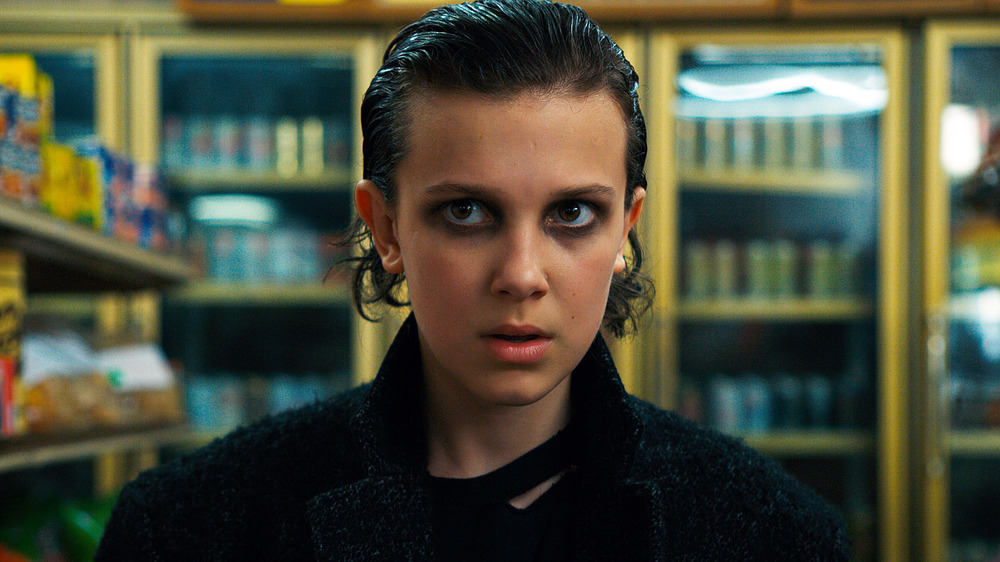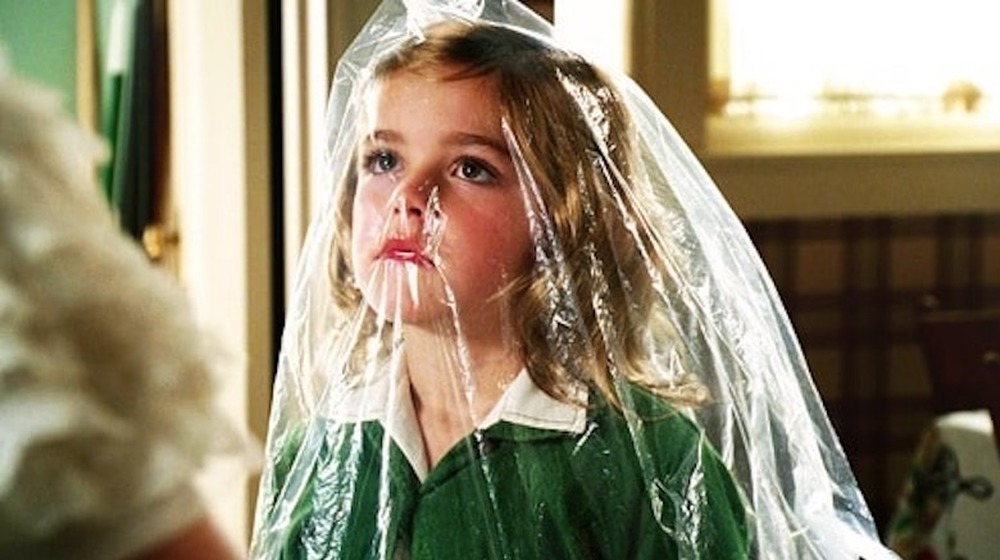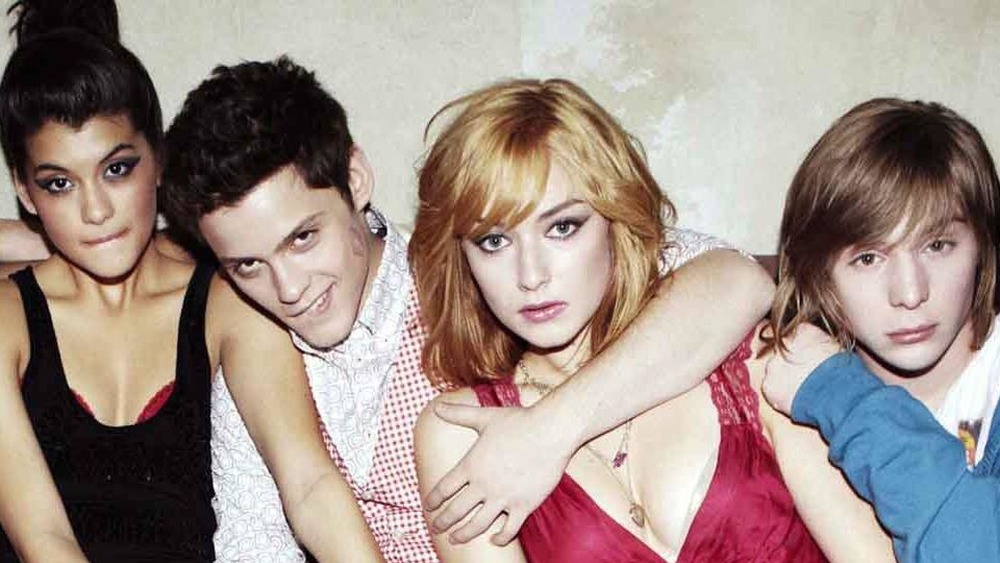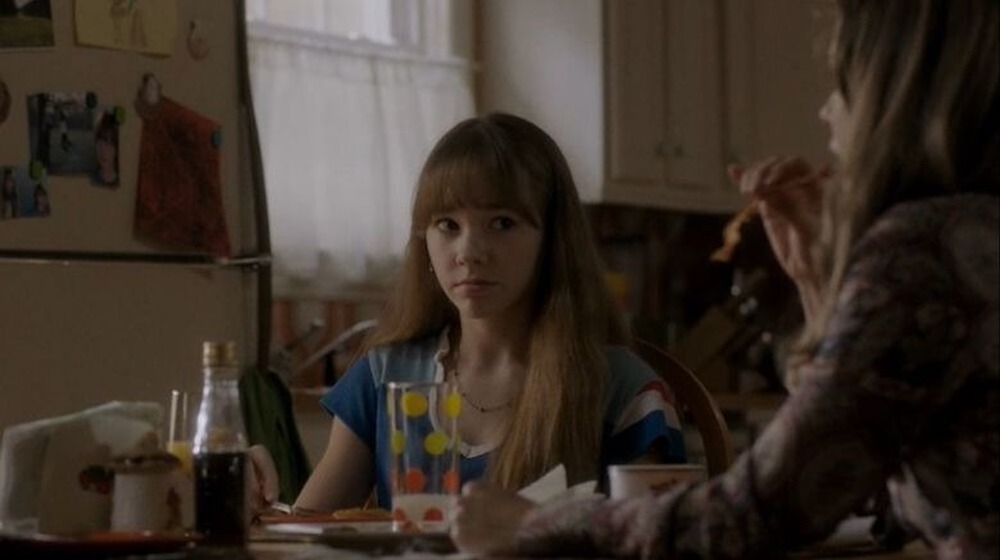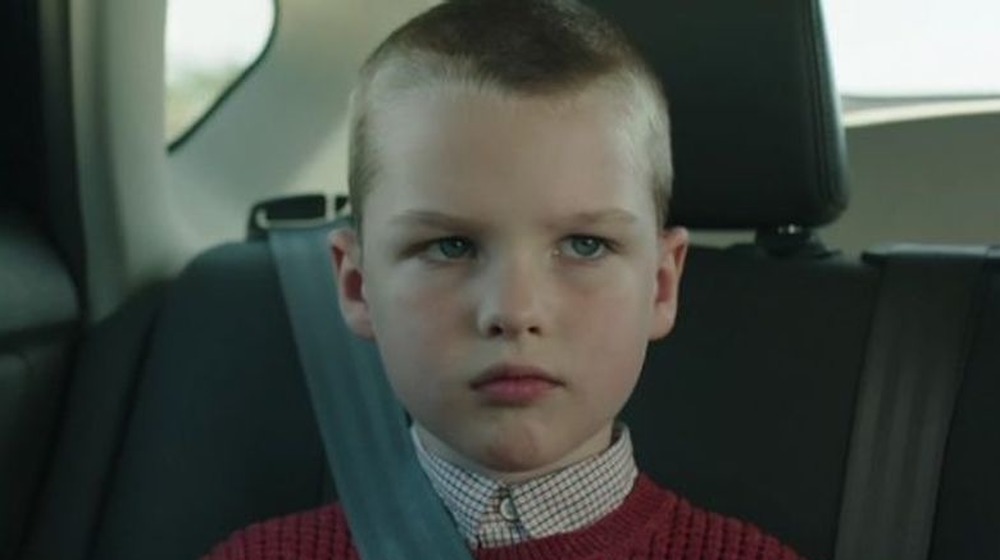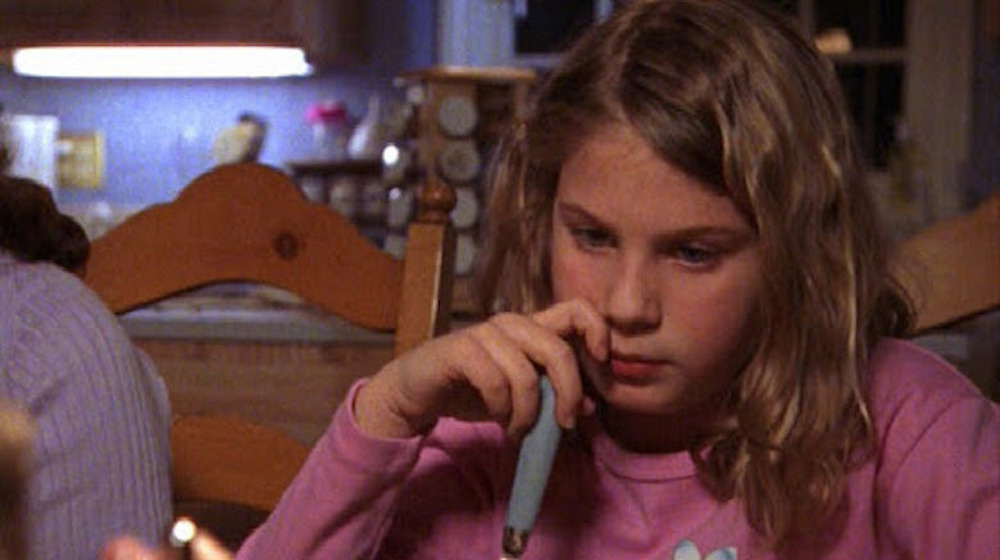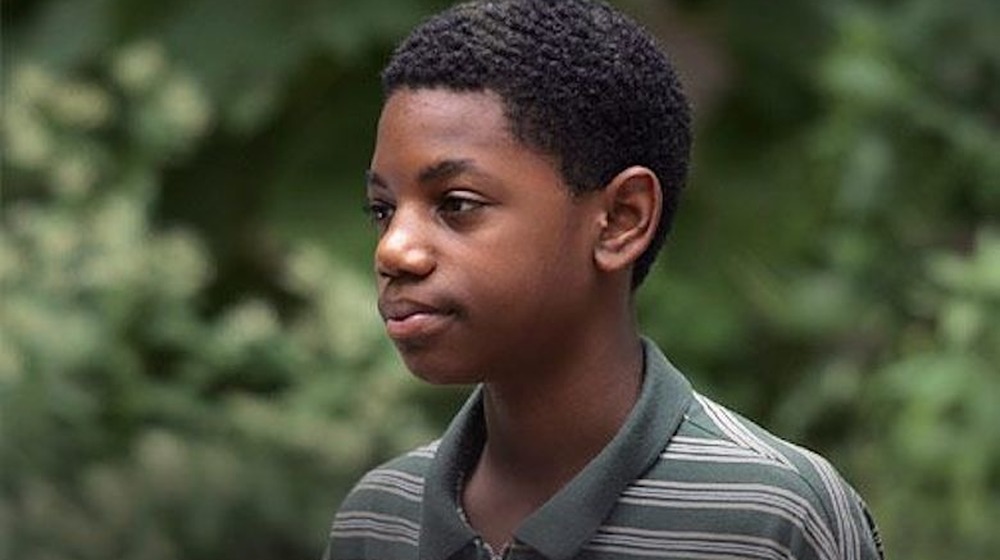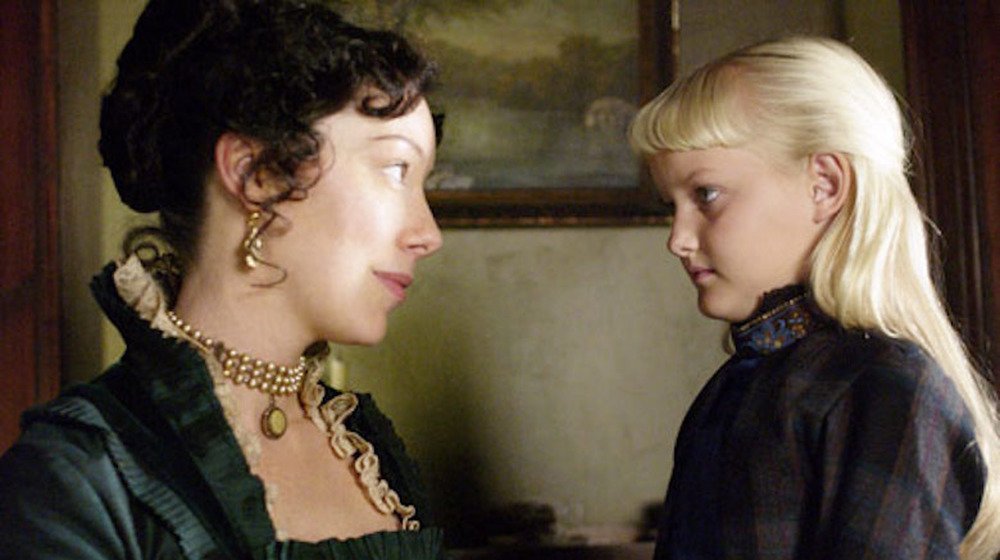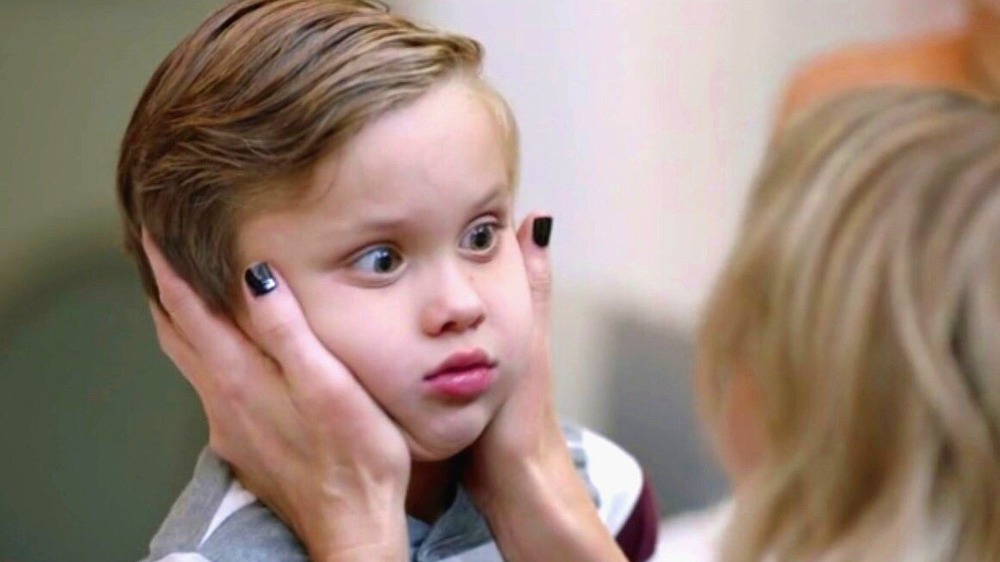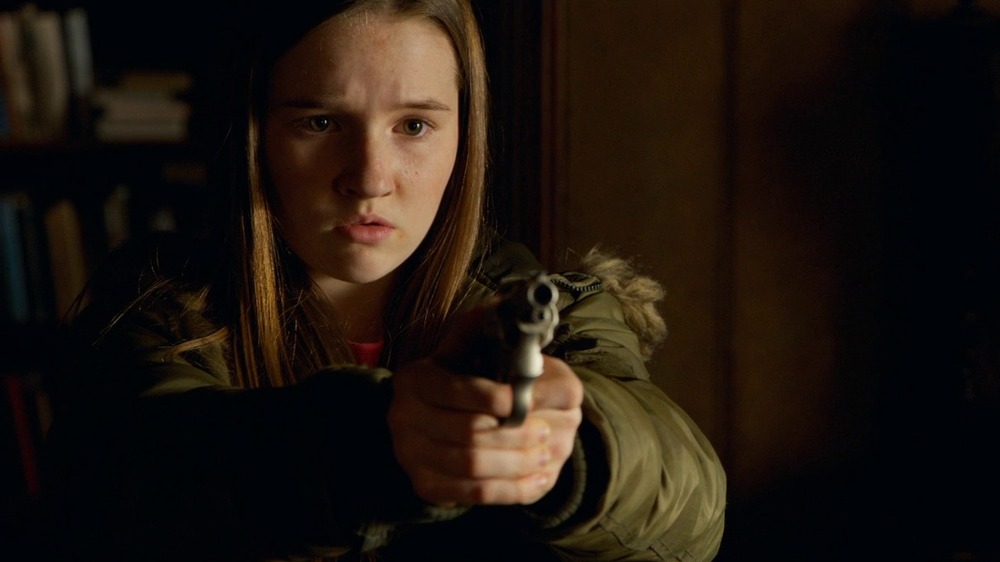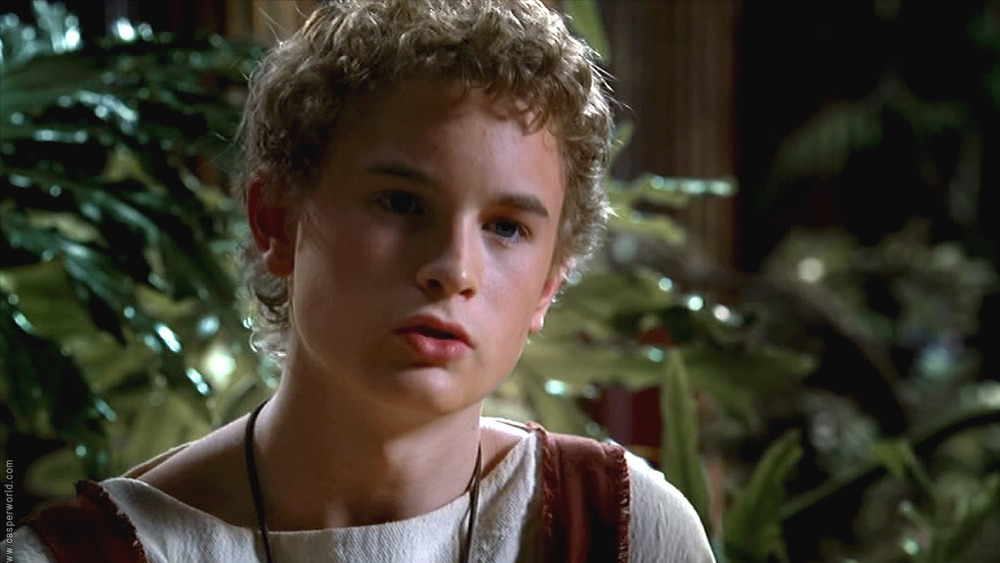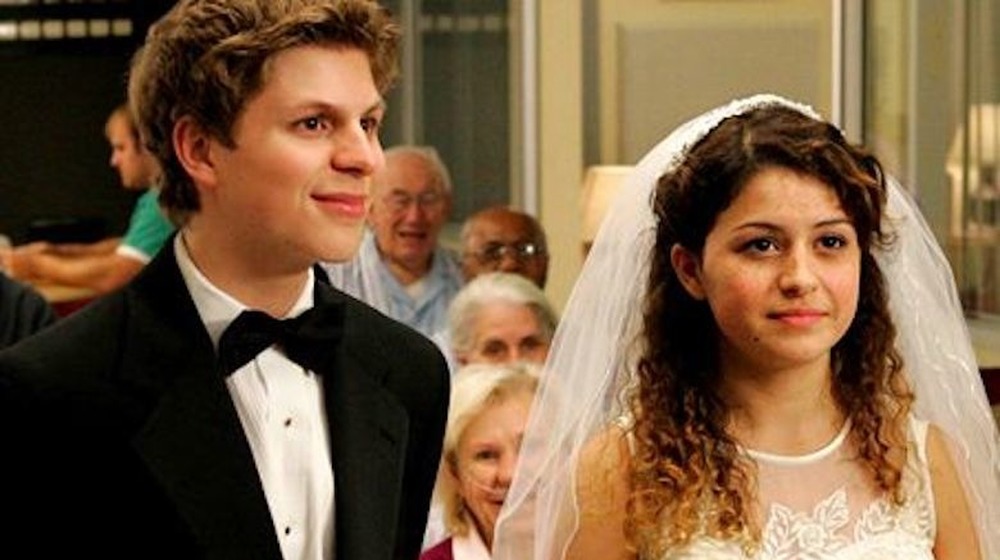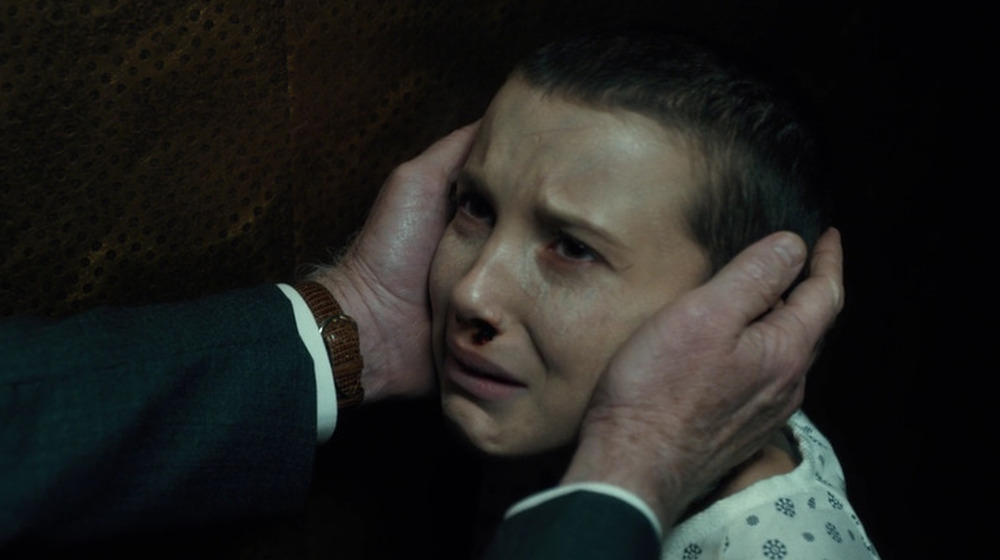TV Roles That Were Too Mature For Child Actors
TV wasn't always able to get as explicit as the movies, and even now, network restrictions and viewer expectations sometimes keep home viewing a little tamer. But overall, the TV landscape has changed. With the rise of cable and streaming services and the popularity of dark dramas and edgy comedies, plenty of shows have ventured into adults-only territory. And even if there aren't supposed to be children in the audience, there are often some kids up on the screen.
Many young actors have taken on roles that have put them in uncomfortable situations or required them to grow up fast. Some of them have stayed in the business, building careers, while others have vanished as they got older, choosing to focus on other work. Sometimes their casting in these grown-up parts was praised, but sometimes it created scandals that defined how audiences saw their shows. Let's take a look at TV roles that were too mature for child actors.
(Warning — there are some spoilers below.)
Kiernan Shipka learned a lot of grown-up lessons on Mad Men
Kiernan Shipka was only seven years old when Mad Men started airing, but it still wasn't her onscreen debut. In fact, she was already a seasoned performer. She'd been on ER as an infant, and she had years of commercials and Jimmy Kimmel Live! sketches under her belt. It was the perfect blend of talent and experience, and she made Sally Draper one of Mad Men's most iconic characters.
But before her range and depth became obvious enough to get Sally promoted to a series regular, her character existed partly just to emphasize how lax '60s parenting could be. Sally gets lessons in mixing cocktails, especially her dad's beloved Old Fashioneds. She runs through the house playing "spaceman" with her mom's dry cleaning bag over her head, prompting a rare moment of parental intervention ... so Betty Draper can make sure she didn't just dump the clothes on the floor.
Highlighting the benign neglect and outright bad decisions in the Draper household, however, still meant giving the real-life Shipka bartending instructions and asking her to have an adult understanding of what was going on. So when playing Sally made her career skyrocket, it's not surprising that many of the roles she moved onto were also kids in jaw-droppingly inappropriate situations. You sneak those cigarettes as Sally Draper and the next day you're enmeshed in the incest of Flowers in the Attic and the demonic possession of The Blackcoat's Daughter. These things escalate so quickly.
MTV's Skins was way too adult for its young cast
When MTV started airing Skins, an American remake of a British show, the outrage was immediate and unsurprising. It wasn't just that the show, like its predecessor, spotlighted teen turmoil and excess — sex, drugs, sex, drinking, and still more sex — it's that it did so while starring so many fresh young faces. Its cast was carefully chosen to be ages 15 through 19 only.
Popular primetime high school soaps like Gossip Girl have generally cast much older actors, shaving the rough edges off real-life adolescence by having their stars all really be glossy and flawless 20-somethings. Accurate youth casting was more often reserved for family-friendly shows. Then along came Skins, which was anything but family-friendly. In fact, the show was rated TV-MA, meaning most of its actors were technically advised not to watch it. Pairing adult material with teen actors not only generated enough controversy to make advertisers eventually pull out, it reportedly even stirred up network concerns about being legally charged over the provocative content they were making.
Interestingly, Skins went further than just having real teenagers in onscreen sexual situations. It had teens elsewhere in the production, too. The writers' room had 30 official teen consultants to lend the show verisimilitude and help make it a real portrait of high school's darker follies. The show didn't have long to make its case for realism, though. Between the outcry and its low ratings, it never made it to season two.
Holly Taylor had to explore mature emotions on The Americans
Playing Paige Jennings (the daughter of Russian spies embedded in 1980s suburban America), Holly Taylor needed to become a powerhouse performer, and she did. As Paige got drawn into her parents' world of secrets and lies, Taylor had to take her character to some dark, shattering places. It was a lot to ask of a performer who was only 13 when she started on the show.
Mostly, what the show asked of Taylor was emotionally exhausting. There was a stretch of episodes where it felt like all she did was cry, and that drained her. But, as she told The Observer, the crying wasn't as demanding as the sheer complexity of adult emotions she had to summon to play a girl whose whole life has been turned upside-down on her. And on top of all that, she had to learn to fight competently.
There's a lighter side to the parallels between Taylor and her character, however. Paige's parents were keeping a huge secret from her, and as it turned out, Taylor's onscreen parents – Keri Russell and Matthew Rhys– were, too. While they were all working together on The Americans, Russell and Rhys fell in love and started a relationship that came as a surprise to Taylor. "I didn't even really know that was going on!" she said. "Honestly!" We bet that surprise was a lot easier to take than the twists on the show, though.
Iain Armitage's character dealt with some serious issues in Big Little Lies
Iain Armitage first rose to internet fame doing YouTube reviews of live theater. That background in criticism — in separating fiction from truth — probably turned to out to be especially good training for Armitage. His role as Ziggy Chapman on HBO's Big Little Lies requires a sophisticated understanding of appearance vs. reality that a lot of young actors couldn't have mastered. And given some of the dark places the series goes to, not having that understanding could have had high stakes.
Throughout the show's first season, Armitage has to play Ziggy with real ambiguity. A large part of the plot centers on accusations that Ziggy has been biting and even choking a little girl in his class, and the audience has to wonder whether or not he's capable of those kinds of outbursts of unsettling violence. In season two, Ziggy also has to face the knowledge that he was conceived through rape. It's a lot to put on a child actor.
Luckily, Armitage seems to have a firm grasp on the boundaries of his part. Acting, he told The New York Times, is just "playing, but bigger, and [with] people watching." And even though he's now had multiple major movie and TV roles, he still finds onscreen entertainment less immersive than the theater. Since he's played some scenes even adults wouldn't want to experience, maybe that's a good thing.
Even with her dad there, The Shield was too mature for Autumn Chiklis
A regular on The Shield, Autumn Chiklis played Cassidy, the daughter of the show's compelling and often terrifying antihero, Vic Mackey, who was portrayed by Michael Chiklis, her real-life father. Her role sometimes dipped into disturbing territory, especially as Cassidy grew a little older and had to confront some of the fallout of her dad's manhandling and dirty dealings, but this was one case where it paid to keep things in the family.
Autumn Chiklis explained to The Hollywood Reporter years later, with relish, "I was on [The Shield], and I was not allowed to watch it all [six] years because they did not want me to see him in that light. A big joke in my family for years was that I thought the show was called The Shield: Get Out because anytime I would come in while they were watching it, they would go, 'Get out, get out!'" Being a good off-screen parent probably made it a little easier for Michael Chiklis to temporarily play monstrous with his daughter. He knew he could protect her from the show's darkest elements.
And there was no danger, thankfully, of Autumn Chiklis confusing her father and his character. "I'm deeply close with my dad," she said. "He's my best friend in the entire world." That's not something you would have ever heard from Cassidy Mackey once she started knowing the truth.
Jermaine Crawford broke our hearts in The Wire
The Wire's gritty, unsparing look at the realities of the War on the Drugs means that pretty much none of the children who rotate through its cast get out unscathed. But in the fourth season — often regarded as the show's best — it came up with a character who would get one of the Wire's all-time bleakest arcs: Duquan "Dukie" Weems, played by a 12-year-old Jermaine Crawford.
Dukie's life is marred by bullying and pervasive neglect, and even the attention and help he gets from new teacher "Mr. Prez" can't ultimately pull him out of his downward spiral. He's a sweet kid with loyal friends and genuine talent, but in the grim social order of The Wire, he's still doomed.
The young Crawford had to show Dukie's gradual descent into homelessness and heroin use. His performance is heartbreaking, and Crawford's obvious youth only emphasizes how much Dukie's life is being wasted. One of the ultimate compliments on his tragic performance is that even as Dukie's childhood is stripped away from him, Crawford portrays him with such an essential innocence that viewers never see him as hardened or even an "old soul."
Instead, Crawford has since had trouble convincing the world that he's grown up. With all the loyal Wire fans still wishing they could protect Dukie, it's hard for the real-life Crawford to get audiences to take him seriously in his budding R&B career.
Bree Seanna Wall had to hear a lot of profanity in Deadwood
Deadwood is Bree Seanna Wall's only screen credit, and when you look at her part, it's easy to imagine how the budding actress might've been scared off. She plays Sofia Metz, the small Norwegian girl orphaned by an attack on her parents' wagon train. Witnessing their slaughter made her retreat into terrified muteness.
It didn't exactly help that Ian McShane's character, the local kingpin Al Swearengen, then spent much of the show's first season debating whether or not to have the child killed as part of a cover-up. It's probably good that Sofia spent so much time either not talking or unable to speak English because, otherwise, a lot of her dialogue would've been heartbreaking. Few actors can provide as much terrifying, perversely genial menace as Ian McShane, and having him loom threateningly over little Sofia is enough to strike fear into our hearts, let alone Wall's.
And, of course, Deadwood was known for its almost Shakespearean deployment of profanity. While creator David Milch's inimitable dialogue is stunning, it's not something that would generally be in a child's vicinity. The show even alluded to this by having Robin Weigert's brash, good-hearted Calamity Jane vow to put a penny in a jar for Sofia every time she cursed. There's a girl who could've been independently wealthy within a year.
Jack Stanton was a kid who found himself in R-rated situations in The Mick
Dysfunction is the bread and butter of The Mick, Fox's two-season comedy about an irresponsible slacker who gets unexpectedly saddled with caring for her wealthy niece and nephews when their parents go on the run from the FBI. The show's comedic masterpiece is arguably Ben Pemberton, played by pre-teen Jack Stanton. Ben is as sweet and innocent as any kid could possibly be ... and there was nothing The Mick liked better than having him stumble into R-rated situations.
It's worse because they're all bad decisions and mishaps easily accessible to most children his age. We have to feel for Jack Stanton's poor parents, having to try to explain why, in real life, their young son shouldn't lick a hibachi grill, plaster himself with nicotine patches, get obsessed with fire, conceal a strange man in his treehouse, marathon extreme horror movies, gobble up birth control pills — and so on and so on. It's the kind of part that cries out for an actor old enough to easily differentiate between fiction and reality. With Stanton, we can only hope that he, unlike his character, still had the maturity to know a bad idea when he saw one.
Kaitlyn Dever went dark in Justified
FX's gritty story of Kentucky crime rarely required the casting of child actors, which makes it even more impressive that they wound up with such a standout. In season two, it introduced Kaitlyn Dever's Loretta McCready, a practical, enterprising, and vulnerable teenage girl whose life gets tragically caught up in the crime empire run by Margo Martindale's down-home but dangerous Mags Bennett. After Mags kills Loretta's father — unbeknownst to her — she winds up taking her in, encouraging her to think of the Bennetts as her family. Dever's tenure on the show required her to play heartbreak and betrayal as Loretta runs an unbelievable gamut of emotions until she hardens enough to start the work of becoming a criminal queenpin in her own right.
Dever was only a young teen when she started playing Loretta, and she wound up being one of the emotional linchpins of what many critics regard as the show's best season. Her high-octane emotions in that part helped lead her to her role in the film Short Term 12, where she played a troubled girl in a group home. After multiple dramas specializing in girls who had to grow up too fast, it was probably refreshing for her to land the part in 2019's Booksmart, a comedy where her character is finally an ordinary high school girl dealing with ordinary milestones.
Max Pirkis played one of TV's edgiest children in Rome
HBO's Rome is equal parts tragedy and romp, fueled by violence, raw sexuality, and political gamesmanship that often involves all of the above. And incongruously, in the middle of all that — at least in the first season — is a child. We're talking about the young Octavian, the eventual Caesar Augustus, who's first played by a baby-faced 16-year-old Max Pirkis.
Octavian looks harmless, but the show quickly reveals that he has a natural talent for political machinations and general scheming. But Pirkis was asked to do more than just show Octavian playing all the angles. Rome often leaned on the squirmy dissonance it could provoke in its viewers when Ancient Rome's different and sometimes appalling norms — including slavery, animal sacrifice, and rape — were put onscreen. And few were better vehicles for that than Octavian, who, even before the show's time skip aged him up, had slept with his sister, been ordered to visit a brothel, and been extravagantly (if wrongly) praised for having the foresight to seduce his uncle.
If anything, Octavian's storylines get tamer once he returns home from war older and played by Simon Woods. Apparently, HBO got most of his taboo-breaking out of the way early on.
Michael Cera and Alia Shawkat had to deal with some mature humor in Arrested Development
Being a sitcom about a family never made Arrested Development a family sitcom, and one of the ways the show liked to gleefully emphasize that was by repeatedly teasing the possibility of incest between cousins George Michael Bluth (Michael Cera) and Maeby Fünke (Alia Shawkat). Shawkat actually played a double dose of incestuous attraction when her character started dating Steve Holt, who — unbeknownst to her — was also her cousin. At least in George Michael's case, there turned out to not be any direct blood relationship.
Shawkat was only 14 when the show started airing, and Cera was 15. While they were old enough to probably have a sense of humor and, more crucially, a sense of distance about their characters' will-they-won't-they arc, it's still odd when you think about the show repeatedly making jokes about how these kids might wind up doing some taboo-breaking kissing. It even throws in a bonus performance of "Afternoon Delight" between Maeby and her uncle, where the gag involves the two of them gradually realizing the song's implications as they're singing it. Arrested Development was adept at testing boundaries in the name of comedy, so it smartly used Cera and Shawkat's youth as another barrier to nudge to get laughs.
Millie Bobby Brown was a child who grew up fast thanks to Stranger Things
On a list of performers asked to deal with explicit sexuality, violence, and despair and degradation, it might seem like Millie Bobby Brown has it easy. While her role as Eleven on Stranger Things is demanding, most of its ups and downs involve things like hitting the limits of her telekinetic powers or needing to hide from sinister government agents. They're the kind of dangers that are separated from reality by a few degrees, and that can be enough to make them fun instead of harrowing.
But while Eleven gradually embraces her powers — becoming heroic and gaining an additional sense of self — the show starts with her in a low and heartbreaking place, one that really hurts. She's playing an abused, terrified, and dehumanized child whose early emotional support comes only from Matthew Modine's sadistic Dr. Brenner, the man she's been taught to call "Papa." Her screaming and asking him for help during horrific experiments — even though he's the man orchestrating her misery — is a painful and familiar echo of ordinary child abuse.
The most adult thing Brown has had to tackle, however, has just been the extreme stardom, which has opened her up to a barrage of internet trolling and tabloid criticism. She has remarkable grace in handling it, however. "Internet trolls have never bothered me," she told Harper's Bazaar, adding, "I honestly actually feel really bad for them because who knows what they're going through."
